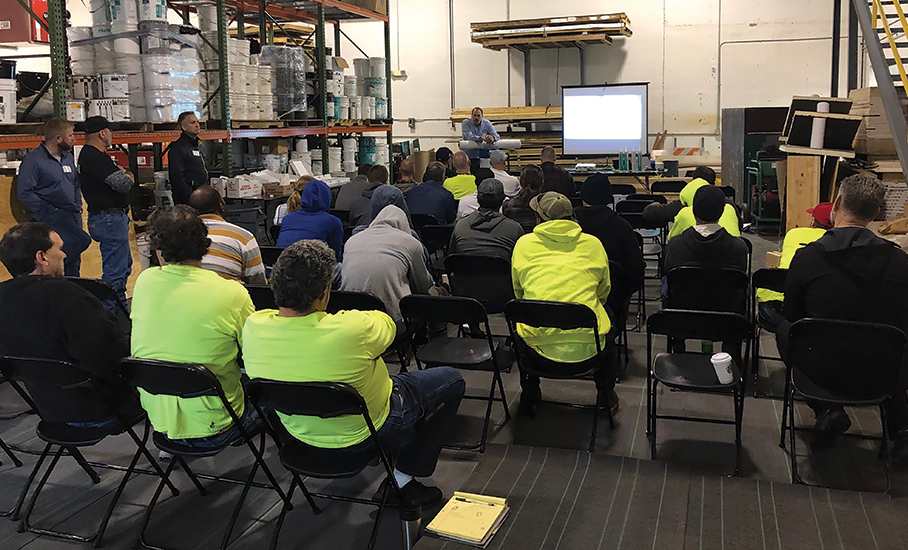
Setting: The fields of France, World War II. A group of U.S. Army Rangers trudges along, all of them frustrated and unhappy. A soldier asks a question of his superior officer.
Private Reiben: “So Captain, what about you? I mean, you don’t gripe at all?”
Captain Miller: “I don’t gripe to you, Reiben. I’m a captain. There is a chain of command. Gripes go up, not down. Always up. You gripe to me. I gripe to my superior officer, so on, so on and so on. I don’t gripe to you. I don’t gripe in front of you. You should know that as a ranger.”
This exchange is from the movie “Saving Private Ryan,” but it could be used to build an entire class about leadership and team management. Let’s unpack a few things.
Miller, played by Tom Hanks, was using the word “gripe,” and that’s a good word. It’s defined as “complaining about something in a persistent, irritating way.” This could include whining or complaining about things in an unproductive manner or venting to get something off your chest.
This isn’t about giving negative or constructive feedback; we need that type of dialogue to ensure outcomes can be as successful as possible. I’m talking about whining or using a tone or attitude that conveys, in effect, “I’m unhappy; this is dumb” and little else. We’ve all seen it. We’ve all likely done it!
One part of a leader’s role is to set the tone for the organization, and you’re likely not succeeding if things are frustrating you all the time. If you believe something is awful, why should others see it any differently? And a team thinking a mission or job is bad is unlikely to succeed in it.
I’ve seen groups essentially talk themselves into failure. Miller easily could have echoed or amplified his squad’s gripes in words or deeds, but would success be more or less likely?
Leaders lead. They set the example. They establish the culture, shape the norms of the group and demonstrate how others should conduct themselves.
Some staff will mirror your tone, words or behavior; others will then be shaped by the staff who mirrored you; and the norms spread outward like a stone causing a ripple in the water. What norms are you spreading without even thinking about it?
I’ve said or done things that aren’t good. And I admit I have griped. I have said and done any number of things that I realized I shouldn’t have and wished I hadn’t. So I keep trying to be better.
It’s also important to clarify a vital balance must occur: We still need to be genuine in our words and tone with our teams. It’s one thing to “gripe up not down.” It’s another to be parroting some official company line with fake positivity. People will be able to tell, and you’ll lose credibility.
When I left Washington, D.C., to join NRCA, I had a plaque made that I gave to my boss, a member of Congress. It summarizes this exact principle. It read:
Don’t be full of shit.
People can smell it.
I apologize for the coarse language, but he was a Marine and you are in construction. I’m sure you can handle it. And whether elected politics or office politics, the principle holds true. People can smell “fake.”
You can’t be the real-life version of the meme showing a cheerful dog saying “This is fine” as the house he’s sitting in burns up around him. You’ll lose all credibility and the respect of your team over time.
In “Saving Private Ryan,” Miller doesn’t gripe down, but he also doesn’t tell his soldiers fake, insincere rhetoric. He is honest and positive-ish in a genuine way while not joining in and griping to (or with) them.
Later in the movie, when the squad is at one of its lowest points and the group’s “griping” is damaging, Miller says to his squad: “I don’t know anything about Ryan. I don’t care. The man means nothing to me. He’s just a name. But if … finding him so he can go home, if that earns me the right to get back to my wife, well then, then that’s my mission.”
He frames their circumstances in a lens that is honest and genuine but also leads them and sets an example worth emulating. Hanks’ character has different paths and approaches to take, and so do we:
- We can be angry and gripe about it, but this is not a long-lasting, repeatable path to success or happiness.
- We can leave, move on to someplace that isn’t the source of the gripes and try to find happiness elsewhere.
- We can stay and find a way to do a job in a way we can be positive or at least at peace with what we are encountering.
These three options apply to everyone. At some point, there may be people on your team who just gripe incessantly. They may not be leaders, but their words or attitudes still damage the squad. We have all likely encountered those individuals in our careers.
It’s one thing for someone to complain occasionally about work to peers (I think it’s the unofficial American pastime!). It’s another thing for that person to gripe in a frequency or severity that is truly damaging to the rest of the group and company culture.
In this situation, you have a tough choice. You can allow the person to stay and continue the toxicity. You can give them the option to leave or force them to do so. Or you can try and change their lens and behavior.
Miller does exactly that with a person in his group who has reached the point of doing irreparable harm to the squad and the mission because of his unhappiness.
“You wanna leave? … Alright. Alright, I won’t stop you. I’ll even put in the paperwork. Just know every man I kill the farther away from home I feel.”
And then Miller goes back to work on the horrible tasks in the horrible mission they are facing. He leads by example. The challenges and frustrations we encounter in the workplace aren’t this close to life and death, but they can be their own form of emotionally draining at times.
How you publicly respond to obstacles and setbacks is critical. It sets you and your team up for long-term success or failure. And how you behave informs your team if you are worthy of being their leader or not. Rise to the challenge. Don’t gripe down.

MCKAY DANIELS
CEO
NRCA



